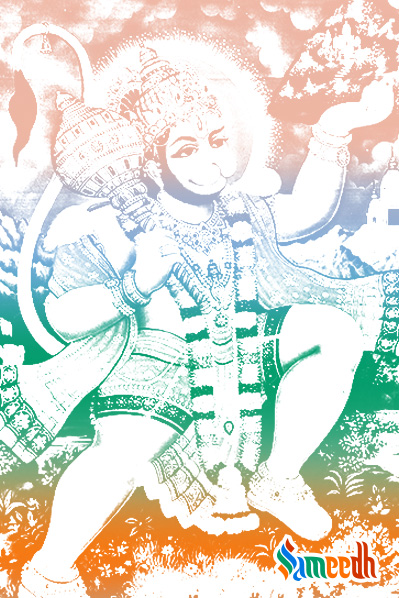The significance of the Hindu Vanar god, renowned for his superior strength.

Hanuman is the vanar, monkey god of Hinduism. He is known for his superior strength, massive build, the power to transform into different sizes and ability to fly. His name means the one having a large jaw. His birth is celebrated as Hanuman Jayanti in Hinduism. He is the devout follower of Lord Ram and one of the major heroes of the Indian epic Ramayan. Hanuman is the son of Vayu, the god of wind and from him, this monkey god inherited the potential to fly.
Origins
Hanuman was born to mother Anjana and father Kesari, a courageous vanar, monkey warrior. There are various stories that explain Vayu fathering Hanuman, including the accidental incident when Anjana devours a sacred pudding meant to impregnate king Dashrat’s wives. Another tale suggests that Vayu and Anjana together have created Hanuman when the former was infatuated with the latter’s mother and her beauty. This encounter resulted in Hanuman possessing great vigour and muscle from his parents, reasoning why he was unusually strong. Upon his birth, his mother’s milk wasn’t enough to quench his hunger and feed his highly energetic body. One of those days, he mistook the gigantic Sun for delicious fruit and went flying to taste it. Enroute, he was stopped and struck on the jaw, known as Hanu, by Indra, the king of gods with his thunderbolt. This is also the reason why the name Hanuman stuck as his jaw remained swollen from then on. An unconscious baby Hanuman fell back on Earth, hurting himself badly. This enraged lord Vayu and he brought Hanuman inside a cave attending to him, but he also brought in the entire atmospheric air with him devoiding the world of the same. This threat to existence made the gods swirl into panic and resort to lord Shiv and Brahma for help. After bringing Hanuman back to his senses, he was gifted with multiple powers of his choice from deities all over to make up for the wrongdoing. God Indra provided him with the strength of his own vajra, a weapon signifying the power of a diamond, its sheer toughness. Goddess Agni with the power of Fire and God Varun, the god of water, granted Hanuman the boon that he shall never be harmed by those elements. His own father, Vayu, further expanded Hanuman’s power to being as fast as the wind and never be bothered by it. Lord Vishnu endowed him with a powerful mace called Gada, which would then become Hanuman’s ultimate weapon of combat. Lord Brahma too allowed his entry to any place that he desired.
As a child, with such unique powers, Hanuman was mischievous and used to tease meditating saints or pull silly pranks on people as he was untouchable. Out of fury and to prevent Hanuman from continuing it, he was cursed to forget about his own powers until reminded of them.
Ramayan
While on an exile of fourteen years, lord Ram along with his wife Sita and brother Laxman were traveling the depths of dense forests. In their tenth year, Sita was abducted by Ravan, the chief of Lanka. The distressed god Ram and his brother wandered in her search. Through this lookout, they come across Sugriv, the king of monkeys. The Maryada Purshottam helps settle Sugriv’s dispute with his brother Vali. During the course of this, Hanuman became an ardent devotee of lord Ram and swore to be his loyal aid and companion throughout life. Hanuman was one of the most fierce warriors in the battle of Ramayan. He was the one who flew to Lanka in search of her. Although Sita expressed her will to return only with Ram, he set ablaze the entire palace of Ravan and flew out unscathed. He also killed multiple demons and caused utter havoc in Lanka. Hanuman is in fact often identified as Ram’s biggest worshipper and supporter. After the war was brought to an end with the death of Ravan, Hanuman was offered to serve in Ram’s kingdom. Hanuman grabbed this opportunity to open his chest bare and display the image of Ram and Sita embossed on his heart, proving his love and respect for them. This is the image that became a major part of his recognition.
Mystical Powers
Hanuman is known to have the ability of transforming himself into the size of something as giant as a mountain and also as tiny as ants or bees. Such was his extraordinary force that he could take the size and form of any creature that he desired. These powers can and have also been achieved and attained through the spiritually enlightened state of Meditation throughout the ancient texts of Hinduism.
He is worshipped widely in his muscular monkey form by Hindus all over. A religious hymn is sung and played in his praise called the Hanuman Chalisa, indicating the 40 verses of the chant. His immense strength, determination, and selflessness evoke ample admiration and faith in the hearts of his followers.